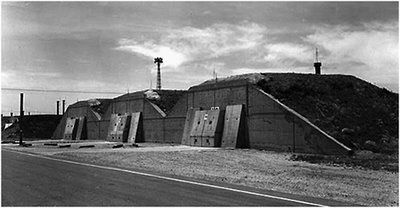Apocalypse Inc.

[Image: Staten Island Oil Facility Explosion Shrouds Manhattan. Photo by YBLOG ZA]
According to the Washington Post, there's approximately 20,000 guns-for-hire today in Iraq. P.W. Singer says roughly one "private security contractor" exists for every ten U.S. soldiers stationed around the Persian Gulf. The "Privatized Military Industry" is a conglomerate of hundreds of companies, thousands of employees, and billions of dollars in revenue. I haven't read this yet, but Singer's book Corporate Warriors explores a profit matrix of private military firms, diplomats, transnational corporations, humanitarian organizations, governments and paramilitary groups embodying an economy of leviathan proportion, in an era of Pentagon pimps, military planners turned CEOs, soldiers in the form of financial personnel, special ops disguised as policy lobbyists, VP's conducting war with marketing campaigns and a whole range of mercs. Perhaps it should be required reading for anyone who doubts the concerns about a fomented privatization of intern(national) security markets.

[Image: Curtains billow from blown-out windows at the downtown Hyatt Regency hotel after Hurricane Katrina hits New Orleans on Monday. Photo by JSOnline]
"From New Orleans to Iraq, rent-a-mercenary companies are having a for-profit field day based on the woes of others," says Tom Engelhardt for Mother Jones. "Such private companies are above the law in Iraq, and their trigger-happy hirees don't hesitate to create mayhem. In part because their own casualties can largely be kept private," he says, "such companies have done much to reduce the political costs of going to war in the United States, while raising the stakes in Baghdad."

[Image: Persian Gulf War 1]
One need look no further than Halliburton which, for all intents and purposes, could be considered the WAL-MART of the military-industrial-complex. The company has made billions in contracting services that used to be carried out by the military — roughly half of all the contracts awarded in Iraq went to KBR — while the Bush administration has fast tracked the conversion of other "critical governmental functions involving prisons, schools, water, welfare, Medicare, and utilities as well as war-fighting" to private enterprise. If you don't think the U.S. economy is in large part dependent on an investment in war, then you need look no further than this article by Frida Berrigan, Privatizing the Apocalypse, who takes us on a little history through the Cold War and brings us up to date on the race to re-capitalize on the nuclear arsenal.
Berrigan says, "Private companies have long played a role in the nuclear complex, but it's been a peripheral one." She mentions Kaiser-Hill, a remediation company, responsible for cleaning up radioactive waste at the Rocky Flats, the nuclear weapons complex in Denver, Colorado. There's CH2M, in Idahao Falls, who's managing the mess after building 52 new nuclear reactors. Not to mention, BWX and Honeywell, who, with Bechtel will oversee the Pantex Plant in Texas, a long time nuclear weapons manufacturer since the Cold War. "At least ten different subcontractors are involved in managing the Hanford nuclear complex" she says.

[Image: Storage bunkers at the Pantex weapon assembly plant in Texas. Photo by NPA]
Today, Los Alamos, Lawrence Livermore, and Sandia — "the high priests of nuclear physics" — are up for sale. Los Alamos, the University of California has already been replaced by Bechtel, a shift continuing to suggest "nuclear laboratories are no longer to be intellectual institutions devoted to science but part of a corporate-business model where research, design, and ultimately the weapons themselves will become products to be marketed."
Plagued by cost overruns, reports of missing classified materials, U.S. weapons programs are increasingly being handed over to the ghosts of private management in the name of service improvement. Berrigan breaks down Bechtel's history of boondoggles by the billions which makes us wonder, how on earth these companies stay in business while repeatedly sabotaging the quality of the projects themselves with their profit portfolios. So then, how can a nuclear responsibility be guaranteed under a Bechtel aegis (or any other private military contractor)?

[Image Faust]
With so much corruption, why then this urge to privatize the apocalypse? We are swiftly reminded of the existential crisis that was imminent for the nuclear complex at the end of the Cold War, which diminished their role after the collapse of the Soviet Union in the face of lesser sized enemies. Berrigan points us to the Nuclear Posture Review where the Bush administration cited a need for a clear revival of a nuclear weapons program that would "be able, if directed, to design, develop, manufacture, and certify new warheads in response to new national requirements; and maintain readiness to resume underground testing if required." Since then, nuclear spending has jumped to nearly one-and-a-half times the Cold War average.

[Image: Pantex Plant, Carson County, TX. Photo: FAS]
How? By "cook(ing) up plans for an alphabet soup of projects as part of the SSMP, scientists are pushing — to mention just a few of the acronyms on the table right now — ASCC, MESA, the RRWP, the ICFHY campaign and the RNEP."
In the article, some of these are explained, but ultimately Berrigan refers to "The Age of Nuclear Terror" and wonders, how can the U.S. expect other nations not to pursue nuclear development even though they have reconvened their own programs feverishly through privatizing and handing them over to the biggest contractors in the business? While the U.S. economy gasps for air in a post-Cold War vaccuum state — clinging to the profit motives that are "increasingly at stake in global nuclear planning" — how does the American government plan to navigate, on one hand try to deter foreign nuke programs by holding the threat of a nuke over their heads, while on the other stoke the nuke race again? Pretty freaky policy. Is that the only solution the Americans have to offer? If you have one now, you're in, but otherwise it's too late. We'll adminsiter the nuke-livity around here. Will the U.S. market boil down to just being a global defense contractor - supplying everyone with weapons and private mercs, groovy warfare gadgets, prefabricated jails, (camouflage bedsheets!) - as an accepted instigator of perpetual-conflict just to feed the nuclear complex's fiscal junk habits? Racing to oblivion, I tell you.
Related: Atomic Britain Privatized







3 Comments:
Some good follow up in Controlling the Bomb By Zia Mian.
I'm reading (and annotating) P.W. Singer's book right now; it's good.
I uploaded my notes on the book so far, not that many since I'm only about two chapters in, but here you go: Notes on Singer.
Great blog, by the way.
jpb:
nice. keep that notebook going. i can't wait to read it myself. in the meantime, i will refer to your jottings down. that's great.
and thanks for reading, don't stop!
b.
Post a Comment
<< Home